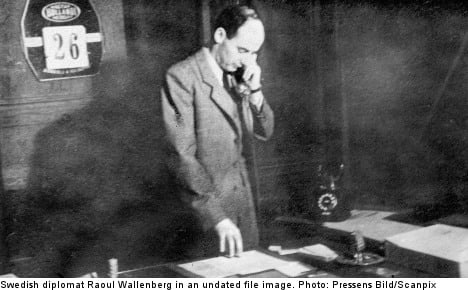Wallenberg's niece Louise von Dardel will travel to Brussels on Monday, carrying a letter addressed to Putin calling for access to key documentation believed to still exist in Russian archives.
Wallenberg, who saved thousands of Hungarian Jews from Nazi gas chambers at the end of World War II, was arrested by Soviet forces in Hungary in January 1945 and has been missing ever since.
His family and independent researchers have spent the intervening seven decades trying to find out what happened to him, and while they have uncovered some clues, there has never been complete closure.
The letter, a copy of which was obtained by AFP, tells Putin that "it is in your hands to end our family's long ordeal".
"In doing so, you would send an important signal to the world that justice can and will prevail, no matter how long it may take," the letter says.
Putin will be in Brussels early this week for a regular summit between Russia and the EU.
Von Dardel, a 63-year-old resident of Geneva, told AFP she was optimistic that the letter would make a difference despite Soviet and Russian intransigence in the past.
"I wouldn't go if I didn't think there was a chance," she said.
"It's been going on for 70 years now. Maybe it's not worthwhile for (the Russian government) to keep it secret any longer."
Soviet and later Russian officials have claimed that Wallenberg died of heart failure in Soviet custody on July 17th, 1947, but have never produced conclusive proof.
Sceptics have questioned that version, with some saying he was executed.
Susanne Berger, a US-based historian who has investigated the Wallenberg case for many years, said that finding the truth about the Swedish diplomat was a matter of principle, arguing that it "was never just about the fate of one man".
"The core issue that lies at the heart of the Wallenberg case and other human rights cases is the question how one balances the rights of the individual versus the interests of the state," she told AFP.
"This question is as current as it ever was, as we now see first-hand in Syria and elsewhere, including Russia," she said.
During his September 2013 visit to Sweden, US President Barack Obama promised the Swedish diplomat's 92-year-old half-sister Nina Lagergren that he would raise the issue of Wallenberg's fate with Putin.
In December, however, the Wallenberg family expressed their frustration at a perceived lack of action by the Obama administration, with von Dardel calling the situation a "huge disappointment".
When contacted for reaction to the family's decision to pursue matters with Putin directly, a spokesman at the US Embassy in Stockholm told The Local that "a key part of Raoul Wallenberg’s legacy is understanding his fate" and that the US will "continue to follow this issue and seek answers to the questions surrounding his disappearance", but could not elaborate further on any specific efforts.


 Please whitelist us to continue reading.
Please whitelist us to continue reading.
Member comments